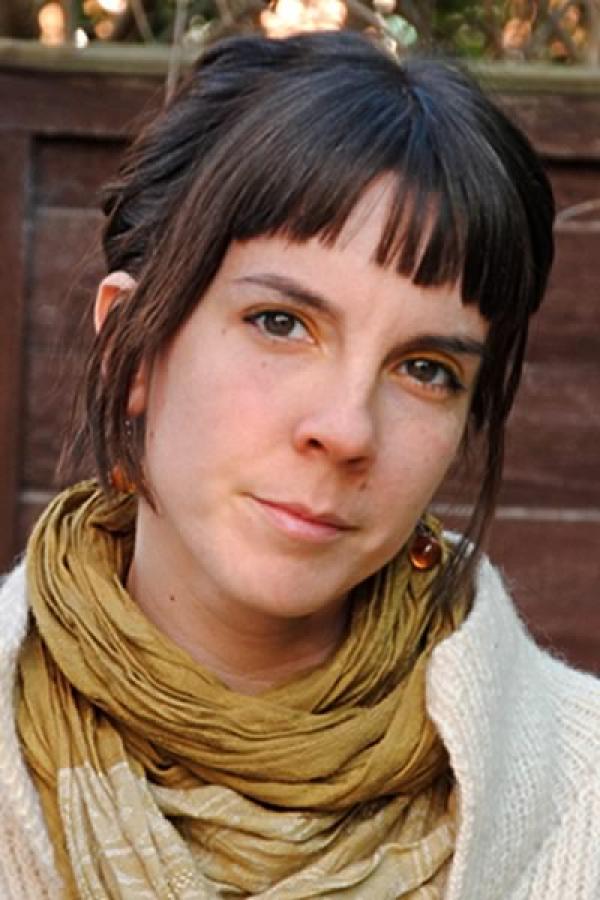Éireann Lorsung

Photo by Jonathan Vanhaelst
Bio
Éireann Lorsung is the author of Music For Landing Planes By (Milkweed Editions, 2007), Her Book (Milkweed Editions, 2013), Sweetbriar (dancing girl press, 2013), and the forthcoming Book of Splendor (Milkweed Editions, 2018). Originally from Minneapolis, she graduated with a BA in Japanese and English and an MFA in creative writing with a minor in studio art from the University of Minnesota; she later received her PhD in Critical Theory from the University of Nottingham. Her writing appears in jubilat, Beloit Poetry Journal, FIELD, Women's Studies Quarterly, DIAGRAM, and elsewhere. For the time being she lives in Belgium, where she runs MIEL, a micropress, and is residency director at Dickinson House, an intimate residency space for writers and artists.
Author's Statement
Despite writing and publishing poems for some years now, I often exclude myself from the category of the "real" writer, i.e. visible, legible, worth attending to; writing for me is a process that is dubious about its public face, different to "being a writer". When I began working on long-form prose objects I felt the sensation of being without authority sharply: a complete interloper. I remember once going to a professor's office and saying, I have no idea how to make fiction.
It turns out, you make it how you make it.
The phone call with Mo (unbelievable!) meant my writing had been seen and somehow understood—the rubric of "prose" was wide enough to accommodate it. I didn't know until then how much I had been wanting the accompaniment of someone else's vision of my work. Being chosen in poetry would have been buoying, too. But being a fellow in prose? —it's like I was walking in the dark for a long time, and when the sun came up it turned out I really had gone somewhere.
So thank you, NEA, and thank you, jury. I am so glad and grateful to be a 2016 Literature Fellow, and for the time, space, and chance to do research and to write that this gives me.
from 1873
So here you are, and here's the door, and the door is still open. And the concrete courtyard behind you has been softened by ferns that push through it, red-brown dots on their undersides. Lichen and mold scaling the walls. The whip-thin horsetails sprouting from the drain grate.
Inside the archive it's damp as a conservatory.
How the first seeds blew in on the wind. How concrete dust piled up. Through every open window gusts of air carried soil; a layer of it everywhere, and the husks cracked around each seed, and the green shoots came through tile and dirt, through paper, through every scrap of the human things you left there.
Here in the stacks, the archive hosts its own weather. A mist that comes from the place itself. Where a volume marked DA-DE lies open on the floor, an ungulate picks through the dim on narrow hooves. Animals arise from books that held their memory. Plants cover ruins. The large flat leaves of a sago palm form a rosette and, before your eyes, over and over, each leaf feathers open. Elevator sagging on its strings; the stairs' tiles crazed by aftershocks. Even with your eyes closed you can remember the sound of your colleagues walking down them—careful, careful, quick—and the building swaying. These floors were the ones you saw buckle.
Your hand on the metal railing touches moss before it touches metal. Kudzu overwhelms a stairwell. By the time you find the sixth floor your shoes are soaked. Through glassless windows, a spray of rain. Puddles here have their own tides. They fill hallways. Your desk is there, the broken mug still in three pieces on the floor, among clumps of liverwort. Grout blackened with mold. Where the double pane was, only an aluminum frame. File drawer full of green water. Algae on the surface, fluorescent green spots that shine when the pale light hits them.
There is nothing left here for you, archivist. Nothing from the world that vanished when the ground shook and the wave came across the land. Hybrid species of rice cultivate themselves in fields not far from here, where salt leaves the soil toxic and the smallest creatures die. Animals unseen for a century move among us now. Leave your old room: your handwritten records and your copies, your white gloves and your memory of books. Take the six flights into the atrium, its smashed glass and tiny soft ferns. Walk out of the humid darkness there, into a new, inhuman light.

